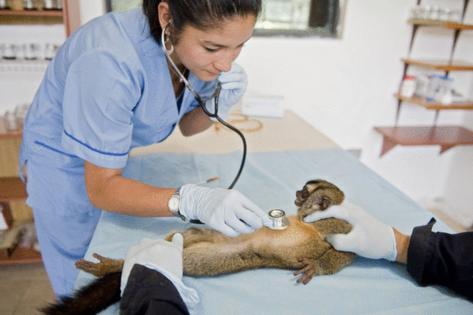Commentary: The CARGO Act -- A bipartisan fix for a $2.2 billion animal testing scandal
Published in Op Eds
Three children as members of a “board of directors.” Housing for more than 100 monkeys consisting of backyard fencing and plastic sheets. No veterinarian. No medical records. And, for years, no permit to experiment on animals.
Practically the only thing legitimate about the “consortium” of overlapping animal testing businesses created by Colombian couple Sócrates Herrera and Myriam Arévalo was the $17 million in taxpayer money they received from the U.S. National Institutes of Health (NIH) over two decades, purportedly to develop a malaria vaccine that still doesn’t exist.
A bill before Congress would prevent this kind of fraud on foreign shores. All Americans should support it.
It’s worth delving deeply into PETA’s 18-month investigation into the Caucaseco Scientific Research Center and its affiliated entities in Valle del Cauca, Colombia, to understand what can go wrong when U.S. tax dollars fund animal experiments in other countries.
Supported in part by your taxes, the owners of Caucaseco illegally kidnapped Aotus monkeys — often called “owl monkeys” — from their forest homes or illegally bred them, infected them with the malaria parasite and surgically removed their spleens.
Although the facility’s reports claimed that organs and tissues had been sent for pathological analysis, an employee alleged that it never happened, stating that “there are no resources to do this type of analysis.”
Experimenters continued the procedures for more than a decade after their permit to experiment on animals lapsed. Caucaseco either killed the animals or let them die from infected wounds. Twenty-one monkeys who may have had malaria were never accounted for.
Although Herrera and Arévalo lied on grant applications and apparently manipulated data, NIH never inspected Caucaseco or its records. Following PETA’s investigation, Colombian authorities raided the campus and seized 108 monkeys and 180 mice, who were also being used in malaria experiments. It was the largest animal rescue operation in the nation’s history.
Herrera and Arévalo were charged by environmental authorities, who then transferred the case to the Office of the Attorney General to investigate additional apparent criminal activity, including cruelty to animals.
PETA’s efforts to turn off the funding spigot to Caucaseco were successful, and Colombian authorities have so far fined the consortium more than $281,000.
But the laboratory is not the only bad actor. The scale of corruption is hard to determine, precisely because NIH has not been looking. From 2011 to 2021, the agency sent $2.2 billion in taxpayer money to approximately 200 foreign organizations in 45 countries without requiring that they abide by the same standards as U.S. labs and with no oversight of how the money was being used, no assurance that experimenters were adhering to local animal protection laws and no verification that the claims made in grant applications and progress reports were true.
Nearly half a million dollars to addict rats to cocaine and almost $2 million to damage monkeys’ brains and induce strokes were sent to laboratories in the U.K. Experimenters in Canada received more than $2.3 million to force-feed mice human feces before killing them and over $1.2 million to drop mice into scalding water to cause third-degree burns over 30% of their bodies.
The landmark bipartisan bill, the Cease Animal Research Grants Overseas (CARGO) Act, introduced by Reps. Troy Nehls, R-Texas-22, and Dina Titus, D-Nev.-01, would slash government waste by prohibiting NIH from funding animal experimenters outside the U.S. This commonsense legislation is endorsed by more than 40 animal advocacy, public policy and research institutions.
The CARGO Act would free up funding that could be redirected to superior, human-relevant methods — such as organs-on-chips, advanced computer modeling and artificial intelligence — used at responsible laboratories in the U.S. and beyond.
This World Week for Animals in Laboratories, lawmakers need to hear that their constituents support the CARGO Act. Sparing dogs, cats, primates, mice and other animals from being tormented in worthless and often criminal experiments in distant laboratories on U.S. taxpayers’ dime is the only logical, sound choice.
____
Dr. Magnolia Martínez is the lead projects manager and congressional liaison for the Laboratory Investigations Department of People for the Ethical Treatment of Animals, 501 Front St., Norfolk, VA 23510; PETA.org.
_____
©2025 Tribune Content Agency, LLC.




























































Comments